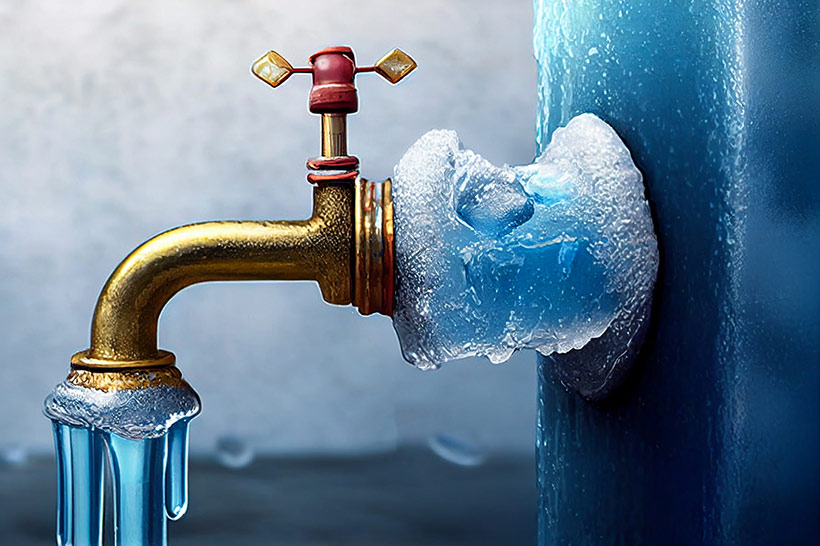Crucial Advice for Avoiding Frozen Pipes in Winter Conditions
Crucial Advice for Avoiding Frozen Pipes in Winter Conditions
Blog Article
In this article below you can find a good deal of sound answers about How To Avoid Freezing Pipes.

Winter can damage your plumbing, particularly by freezing pipes. Below's exactly how to avoid it from happening and what to do if it does.
Introduction
As temperatures decline, the risk of frozen pipelines rises, possibly bring about pricey repairs and water damage. Comprehending just how to stop frozen pipelines is important for house owners in cold climates.
Avoidance Tips
Shielding susceptible pipelines
Wrap pipelines in insulation sleeves or make use of warm tape to safeguard them from freezing temperatures. Focus on pipes in unheated or exterior locations of the home.
Heating methods
Maintain interior spaces adequately warmed, especially locations with pipes. Open cabinet doors to permit warm air to flow around pipelines under sinks.
How to identify frozen pipes
Look for decreased water flow from taps, unusual odors or noises from pipes, and visible frost on subjected pipes.
Long-Term Solutions
Architectural modifications
Think about rerouting pipelines far from outside walls or unheated areas. Add extra insulation to attics, basements, and crawl spaces.
Upgrading insulation
Invest in top notch insulation for pipes, attic rooms, and walls. Appropriate insulation aids preserve constant temperature levels and lowers the risk of frozen pipes.
Safeguarding Exterior Pipes
Garden pipes and outside faucets
Detach and drain pipes garden pipes before winter season. Set up frost-proof faucets or cover outside taps with protected caps.
Recognizing Frozen Pipes
What triggers pipes to ice up?
Pipes freeze when exposed to temperatures below 32 ° F (0 ° C) for expanded durations. As water inside the pipelines freezes, it broadens, taxing the pipe wall surfaces and possibly causing them to burst.
Threats and problems
Icy pipes can result in supply of water disruptions, residential property damage, and costly repairs. Burst pipelines can flood homes and create extensive architectural damage.
Signs of Frozen Piping
Identifying frozen pipes early can prevent them from rupturing.
What to Do If Your Pipelines Freeze
Immediate actions to take
If you think frozen pipes, maintain taps open to eliminate stress as the ice thaws. Use a hairdryer or towels taken in warm water to thaw pipes slowly.
Verdict
Protecting against frozen pipelines needs aggressive steps and quick reactions. By comprehending the reasons, indicators, and preventive measures, home owners can secure their plumbing during cold weather.
Helpful Tips to Prevent Frozen Pipes this Winter
UNDERSTANDING THE BASICS: WHY PIPES FREEZE AND WHY IT’S A PROBLEM
Water freezing inside pipes is common during the winter months, but understanding why pipes freeze, and the potential problems it can cause is crucial in preventing such incidents. This section will delve into the basics of why pipes freeze and the associated problems that may arise.
THE SCIENCE BEHIND FROZEN PIPES
When water reaches freezing temperatures, it undergoes a physical transformation and solidifies into ice. This expansion of water as it freezes is the primary reason pipes can burst. As the water inside the pipe freezes, it expands, creating immense pressure on the walls. If the pressure becomes too great, the pipe can crack or rupture, leading to leaks and water damage.
FACTORS THAT CONTRIBUTE TO PIPE FREEZING
Low Temperatures: Extremely cold weather, especially below freezing, increases the risk of pipes freezing. Uninsulated or Poorly Insulated Pipes: Pipes located in unheated areas, such as basements, crawl spaces, or attics, are more prone to freezing. Insufficient insulation or lack of insulation altogether exacerbates the problem. Exterior Wall Exposure: Pipes running along exterior walls are susceptible to freezing as they encounter colder temperatures outside. Lack of Heating or Temperature Regulation: Inadequate heating or inconsistent temperature control in your home can contribute to frozen pipes. PROBLEMS CAUSED BY FROZEN PIPES
- Pipe Bursting: As mentioned earlier, the expansion of water as it freezes can cause pipes to burst, resulting in significant water damage.
- Water Damage: When pipes burst, it can lead to flooding and water damage to your property, including walls, ceilings, flooring, and personal belongings.
- Structural Damage: Prolonged exposure to water from burst pipes can compromise the structural integrity of your home, leading to costly repairs.
- Mold and Mildew Growth: Excess moisture from water damage can create a favorable environment for mold and mildew growth, posing health risks to occupants.
- Disrupted Water Supply: Frozen pipes can also result in a complete or partial loss of water supply until the issue is resolved.
WHY CERTAIN PIPES ARE MORE PRONE TO FREEZING
- Location: Pipes located in unheated or poorly insulated areas, such as basements, crawl spaces, attics, or exterior walls, are at higher risk of freezing.
- Exterior Pipes: Outdoor pipes, such as those used for irrigation or exposed plumbing, are particularly vulnerable to freezing as they are directly exposed to the elements.
- Supply Lines: Pipes that carry water from the main water supply into your home, including the main water line, are critical to protect as freezing in these lines can affect your entire plumbing system.
- Underground Pipes: Pipes buried underground, such as those connected to sprinkler systems or outdoor faucets, can be susceptible to freezing if not properly insulated.
https://busybusy.com/blog/helpful-tips-to-prevent-frozen-pipes-this-winter/

I have been very serious about 6 Ways to Prevent Frozen Pipes and I'm hoping you enjoyed reading our article. Do you know about another person who is enthusiastic about the topic? Please feel free to share it. We thank you for reading our article about How to prepare your home plumbing for winter weather.
Call Today Report this page